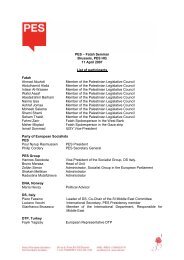Hedge funds and Private Equity - PES
Hedge funds and Private Equity - PES
Hedge funds and Private Equity - PES
Create successful ePaper yourself
Turn your PDF publications into a flip-book with our unique Google optimized e-Paper software.
136<br />
Based on this observation, one could conclude that the potential impact of failing hedge <strong>funds</strong><br />
remains small. By contrast, the FSA argues that a hedge fund with say $1 billion of assets under<br />
management may have a far greater market impact than a traditional investment fund with the same<br />
amount of assets under management. 67 Besides the absolute <strong>and</strong> relative growth in the assets<br />
under management, this is due to several of the factors that we turn to in the next subsections.<br />
5.3 Short selling<br />
Historically, hedge <strong>funds</strong> are often associated with “short selling”, i.e. the use of strategies<br />
allowing investors to gain from the decline in price of securities as well as currencies or raw<br />
materials. However, short selling has a longer history than the first hedge <strong>funds</strong>, which were set<br />
up after World War II. For instance, short sellers were blamed, in part, for the Wall Street Crash<br />
of 1929.<br />
It is only a limited segment of hedge <strong>funds</strong> that is actually practicing short selling. Yet those who<br />
do are often charged of being trend-setters, i.e. of causing price depreciation independent of<br />
the underlying market fundamentals. This was for instance the case during the currency crisis<br />
of 1992, where some believed that the short selling strategies of the Soros-led Quantum hedge<br />
fund were the sole cause of the devaluation of the British Pound.<br />
In the light of the current size of assets under management, there can be little doubt that some<br />
hedge <strong>funds</strong> – alone or through concerted action – can influence prices independent of fundamentals,<br />
thereby causing instability. This is especially the case in smaller illiquid markets. Yet, it<br />
is also not unlikely that it could happen in larger <strong>and</strong> more liquid markets.<br />
In some cases there were suspicions that hedge <strong>funds</strong> – for instance by applying short selling<br />
strategies – have been engaging in manipulation, collusion or other possibly unfair trading practices.<br />
However, it is difficult to draw the line between seemingly manipulative trades <strong>and</strong> rational<br />
economic behaviour. Furthermore, it is even more difficult to obtain information about whether<br />
such a line has been crossed. For instance, the Financial Stability Forum has declined to<br />
conclude that hedge <strong>funds</strong> had compromised market integrity in the cases analysed in a report<br />
on highly leveraged institutions. Thus, the true motives were very difficult to prove. In addition,<br />
quite often it was traditional financial institutions <strong>and</strong> investors, <strong>and</strong> not hedge <strong>funds</strong>, which<br />
seemed to lead or precipitate market crisis <strong>and</strong> crashes. 68<br />
5.4 Increasing correlations<br />
A key concern regarding hedge fund <strong>and</strong> financial market stability is related to increasing similarities<br />
or correlation among hedge fund strategies. Where hedge <strong>funds</strong> are pursuing similar<br />
strategies there is an increasing risk that they will buy or sell their positions at the same time<br />
thereby disturbing liquidity, i.e. the normal fundamentally driven supply <strong>and</strong> dem<strong>and</strong>. 69 This could<br />
in turn leave hedge <strong>funds</strong> <strong>and</strong> third parties like banks <strong>and</strong> institutional investors highly vulnerable<br />
to adverse market dynamics.<br />
The current empirical evidence as to whether hedge <strong>funds</strong> <strong>and</strong> institutional investors engage in<br />
such “copy-cat” behaviour is alarming. According to ECB calculations, the recent increasing<br />
competition in hedge fund markets has come along with increasing correlations among hedge<br />
fund strategies. In this connection, the ECB has stated that “... the correlations among hedge<br />
fund strategies tended to increase more or less continuously after mid-2003, reaching an all-<br />
66 Wall Street Journal (2006): Double trouble valuing the hedge-fund industry, July 8/9, 2006, p. B3.<br />
67 FSA (2005): ibid., item 3.29.<br />
68 Financial Stability Forum (2000): Report of the Working Group on Highly Leveraged Institutions,<br />
http://www.fsforum.org/publications/Rep_WG_HLI00.pdf (02.12.2006)<br />
69 E.g. Counterparty Risk Management Policy Group (2005): Toward greater financial stability: A private sector perspective, July, p. 48.




